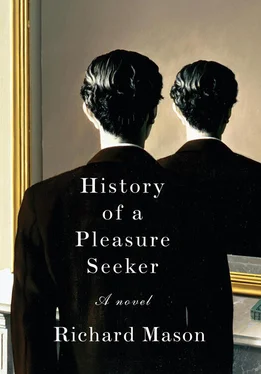Piet, who had been nerving himself to make an interjection, kept silent. But now another fellow stepped into the center of the group with the unstudied assurance of a handsome man who is also very rich. His face was thin and finely wrought, its expression disdainful. “You won’t catch me on the Lusitania ,” he said. “The only ship worth the trouble is the Eugénie .”
The appearance of this attractive oracle inspired an abrupt cessation of feminine hostilities. “And why is that, Mr. van Sigelen?” asked Constance, who assumed the right of first response.
“I don’t care a fig for speed or size. Comfort and service are all I consider, and the French are best at both. Albert Verignan’s a genius. He built the Loire Lines Company from scratch and sees to every detail himself. She is the only ship to have a theater. The grill room is the most spectacular at sea. And the first-class suites rival those of your father’s hotels, Miss Vermeulen-Sickerts. I recommend the Henri de Navarre, which has an enormous bath. Each is decorated for a figure from French history.”
Piet listened as Mr. van Sigelen elaborated on the liner’s charms. To disguise his awkwardness at lingering so long, he accepted another glass of champagne from Didier. He heard that the Eugénie ’s first-class grill room, a miniature of the Hall of Mirrors at Versailles, with fourteen-foot windows running the length of one side, was located so high above the sundeck that only the horizon was visible. “It’s like dining on a cloud,” van Sigelen told them. “One half expects to see angels strumming harps.”
This little joke provoked laughter of an altogether more sympathetic kind, and under cover of it Myrthe Janssen slipped her arm through Mr. van Sigelen’s and led him to the dance floor.
“The Eugénie ’s steam triple-expansion engines don’t compare at all well with, say, the quadruple expansions of the Kaiser Wilhelm II ,” said Norbert Breitner, in an attempt to reassert his authority. “Forty thousand people came on board to inspect her the first time she docked at New York.”
“No!” exclaimed Constance; and it seemed to Piet that her real objection was to Myrthe’s deft removal of Mr. van Sigelen.
“Believe me, my dear Miss Vermeulen-Sickerts, that is absolutely true. I was there.”
It was not clear to Piet that Constance, by employing a word that began with n , was resuming the alphabet game where Louisa’s “maiden” had left it; but a third glass of champagne sanctioned daredevilry and in a clear, confident voice he said: “ Opium . You must have smoked it to hallucinate such a crowd.”
There was silence.
The young women turned to him, aghast to have their machinations exposed by a stranger. Louisa said nothing. But Constance, observing the intensifying pink of Norbert Breitner’s cheeks and aware that she was looked to for leadership, said: “ Passion is a wonderful quality. Don’t tease, Mr. Barol.”
Four hours later, having deposited an armful of birthday presents on her desk, Constance let her dress fall to the floor and crept into Louisa’s bed in her shift. Her sister sat at the dressing table, taking the diamond clips from her hair. On the subject of Piet Barol she kept her silence until Agneta Hemels had brought in a tray of hot chocolate, removed Constance’s dress, and congratulated them on a triumphant success. When the servant had gone, following her sister’s train of thought with the precision that so unsettled their friends, she said: “I maintain, Constance, there’s something false about him.”
“You’re so sullen and suspicious.”
“You’ll find I’m right.”
“It’s not because you think I’m in love with him any longer?”
“I never thought you were in love with him, darling. You wanted him to love you, which is something different entirely.”
“Whatever it is, I’m done with it.”
“I know.”
“You’ll agree it was funny.”
“Suggesting that Norbert Breitner is an opium addict?”
“Being sharp enough to catch on and brave enough to play too. Norbert’s such a pompous fool.”
“With that I wholeheartedly agree. And I never suggested that our Mr. Barol was anything less than sharp.”
“There, you said it. ‘Our’ Mr. Barol.”
“ ‘Your’ Mr. Barol, then.”
Constance turned on her side. “Wouldn’t it be fun to have a brother? Someone to go about with, and gossip with, and persuade our friends to marry?” She spoke wistfully to the wall. “Egbert’s so hopeless.”
“There’s no use being friends with a person who doesn’t tell the truth.” Louisa climbed into bed next to her sister and yawned. “Piet Barol will always say what he thinks you want to hear.”
“You’re a miserable cynic.”
They fought on as the sky lightened to indigo. Finally Louisa said: “Very well. Let’s ask him to tea with Karina van Prinsterer. You mark my words: he’ll tell us she charms him and the house is beautiful.”
The next afternoon, Maarten Vermeulen-Sickerts left for New York to supervise the completion of his most ambitious undertaking yet, a hotel of unrivaled opulence at the corner of Fifth Avenue and the Central Park. The family saw him off at the docks and on their return to Herengracht 605 Constance asked Piet if he’d care to join them at tea with a friend.
“A dear friend,” added Louisa. “With one of the loveliest houses in the city. Her mother’s a lady-in-waiting to Queen Wilhelmina.”
With difficulty, Piet disguised his excitement at the prospect of meeting a member of the royal household. He had only twenty minutes to change and chose the most elegant of the Charvet ties Maarten had given him. When he had knotted it five times he was more than satisfied with his reflection.
The van Prinsterers lived on the Keizersgracht. Piet escorted the girls on foot, wishing that a childhood enemy might cross his path and observe him with such a fashionable pair. Their destination proved to be a gloomy mansion, six windows across, with a coat of arms emblazoned in scarlet and gold above its doors. These opened before they could knock, as though someone were permanently on duty at them. In the vestibule were two very tall footmen in mustard-yellow livery. Piet gave his hat to one and looked about, prepared to be impressed.
But he was not impressed.
The hall was a strident blue, fussily embellished in shiny gold leaf. In the ornate wrought-iron balustrade of the staircase, the letters LVP (for Leopold van Prinsterer, the current occupants’ grandfather) were pricked out in gilt. It struck Piet as overanxious to advertise oneself in this manner. He found it vulgar. Vulgar too was the cluttered drawing room full of heavily fringed furniture, its tables weighted with framed photographs of notable personages. Most vulgar of all was the presence on the mantelpiece of a large stuffed peacock, fanning its tail over the silver frames like a pagan deity in a graveyard.
He was examining a signed portrait of Crown Princess Marie of Romania when the van Prinsterer ladies appeared. They were absurdly overdressed. Miss van Prinsterer’s skirt was tied tightly below her knees by a tasseled cord that swung wildly with every mincing step. Her lace sleeves hung almost to the floor and became fans whenever she raised her arms — which she often did to flaunt this effect. In her fuss of crinolines and tulles, her mother resembled a cream puff that has aged during its display at the baker’s.
Nor did they compensate in charm for these sartorial deficiencies. Piet had looked forward to performing one of the anecdotes, as polished as the satinwood tea stand between them, with which he had delighted women of the better class before. He intended to make a deftly self-effacing impression and to bow to the demand that he continue his wonderful stories with becoming shyness. But he was first disconcerted and then annoyed to discover that he was not permitted to make any impression at all.
Читать дальше












